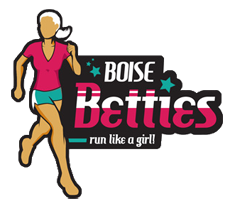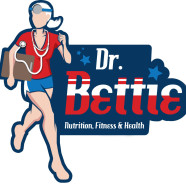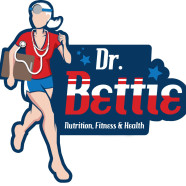DR. BETTIE- Cardiac Problems in Endurance Athletes
Welcome to Dr. Bettie’s Corner, your local expert in nutrition, fitness, and health! This is a bimonthly forum where we attempt to address Woman-focused topics of interest.We welcome your suggestions & questions! Pleasecontact us with yours. Cardiac Problems in Endurance Athletes We all know that exercise is good for your heart. It decreases blood pressure, lowers blood cholesterol, maintains healthy body weight, and diminishes your risk of developing chronic diseases including diabetes mellitus. But are there instances when exercise – specifically, endurance exercise such as distance running – may be harmful? I grit my teeth as I painfully type the word “Yes”… But, yes. Even if your brain and your spirit crave that morning glide through the heathery foothills, there may be a few things to think about before pronouncing to the world that THIS is THE BEST way to maintain a happy heart. The scary stuff. These are the unpredictable, and often inherited, problems that result in sudden death. It can include structural problems with the muscle of the heart itself (e.g., hypertrophic cardiomyopathy), valve problems (e.g., aortic stenosis), electrical problems resulting in abnormal coordination of the pumping action (e.g., Wolff-Parkinson-White syndrome, long QT syndrome), or plumbing problems where the blood supply does not get to the muscle normally, creating an oxygen deficit (known as congenital anomalies of the coronary arteries). Fortunately, they are uncommon. But for those that do have these problems, endurance exercise is more or less forbidden. Athlete’s heart. It is well recognized that the heart muscle experiences structural changes with exercise, commonly observed as a global thickening of the main pumping chamber. (Not surprising, considering that structural changes with every other muscle in your body occur with exercise as well.) Historically, this has not been considered a bad thing, and has been shown to reverse after training is discontinued. However, there has recently been a body of literature that suggests some of this remodeling effect observed in high level athletes – which specifically includes enlargement of the one of the upper chambers of the heart – may serve as a nidus for an annoying, though usually not life-threatening, rhythm problem known at atrial fibrillation. The data are not perfect here, but multiple studies from several countries have replicated this association, and the increased risk appears to be pretty substantial (2-10x increased risk). Is this You, you may ask? Well, the answer is, we just don’t know. “High level” has had multiple definitions: 3 hours or more per week of intense training, 1500 lifetime hours of endurance exercise, being within the highest category of a large population polled, or simply just participating in a couple of long distance events (marathons, the Tour de France, cross-country ski races… Who cares, those crazy endurance people are all alike anyway, right?!). To say the least, the optimal dosing of frequency and intensity of endurance training has yet to be determined. And to add insult to injury… We don’t know the risk among women, as they have been underrepresented in these studies. Are there other risks? The main risk with atrial fibrillation includes stroke. However, most athletes have few risk factors that make this a major concern. Talk to your doctor. Gimme some good news?!!. Low to moderate amounts of exercise show NO such association with atrial fibrillation. Among those afflicted, detraining may help – a few weeks off, then a couple of 3-4 mi runs per week may be tolerated. Lastly, there are effective medical therapies also available. When to worry/seek help. If you experience chest discomfort, unusual breathing trouble, sudden exercise intolerance, and/or lightheadedness with exercise,...
Read MoreJust Who Is Dr. Bettie?
Just Who Is Dr. Bettie? Actually, there are two Betties on the job! The Boise Betties are lucky to have such a wealth of knowledge and research abilities on the team- and these two women came forward asking for the job. I didn’t even know we needed a Dr. Bettie and yet I find their articles so interesting and relevant. What question do you have for the Drs? Dr. Jennifer Anderson is a board certified cardiologist with practice locations in both Boise and Eagle, Idaho. She received her medical degree from the University of Washington School of Medicine, and completed a fellowship in cardiovascular disease at Wake Forest University in North Carolina. Dr. Anderson’s career journey began with graduate work in both Exercise Physiology as well as Nutritional Sciences, giving her patients comprehensive, innovative care that emphasizes lifestyle intervention and disease prevention. She ran competitively for the University of Maine and still holds a place among their all time top runners in the 10,000m race. Samia McCall boasts a background in law with a degree from American University in Washington, DC and maintains bar membership in three states. As a self described “research monkey”, Samia’s curious mind leads her to research and answer questions from an incredible variety of topics- particularly those tying back to her passion for running. As an empathetic teammate and runner who has suffered her fair share of injuries, Samia brings thorough research to the table for each Dr. Bettie post. She is an accomplished runner, and is finding her stride again after a plague of injuries over the past few years. In her first race back Samia beat her Robie Creek personal best (set nearly 7 years ago before she had children!). Check out Dr. Bettie’s previous articles here: To Beer or Not To Beer? Strategies for Diminishing Body Fat Hips Don’t Lie Five Ways to Avoid Needing a Cardiologist ...
Read MoreDR. BETTIE- To Beer or Not To Beer: That is the Question
Welcome to Dr. Bettie’s Corner, your local expert in nutrition, fitness, and health! This is a bimonthly forum where we attempt to address Woman-focused topics of interest. We welcome your suggestions & questions! Please contact us with yours. To Beer or Not To Beer: That is the Question If you are anything like me, you might think that one of the best things about a good race or a long run is treating yourself to a beer (or three) at the end of it. But is this kind of indulgence helpful or hurtful to our training? Believe it or not there are several health benefits to beer. For starters, it can help re-hydrate you after a long run or race. In a 2013 study, researchers at Granada University in Spain found that beer actually helped hydrate better than water or Gatorade after a workout. Next, beer is good for your bones. It contains silicon which helps increase bone density. Increased bone density can help guard against stress fractures. Beer also contains B Vitamins, and a researcher at Oregon State University found that lager beer in particular contained more antioxidantsthan green tea. And you all just thought I was drinking the beer for the head buzz! But there is the social aspect of it too. Us runners can be fun-deprived at times (well, at least this one can). We go to bed early on Friday nights to get up early for long runs on Saturdays, and we think the idea of good summer fun is cramming into a van with a bunch of our friends to spend all day running up and down a mountain together. So a beer with a friend at the end of a long run or a few drinks at the end of a race is a great time for us to fraternize, build camaraderie, and get to know each other a little bit more. This in turn can help release mood-boosting endorphins which will have a positive effect on our mental well-being. Being social and having fun, with or without the beer in hand, helps us encourage each other which can help keep us consistent in our training and racing. As long as you do not indulge to the point that you are getting sick or feeling horrible the next day, it should not affect your fitness or training. And if beer is not your thing, no worries. There’s usually water and protein-packed chocolate milk at the finish line too. And once you’re done drinking those, would you mind giving me a ride...
Read MoreDR. BETTIE- Strategies for Diminishing Body Fat
Welcome to Dr. Bettie’s Corner, your local expert in nutrition, fitness, and health! This is a bimonthly forum where we attempt to address Woman-focused topics of interest. We welcome your suggestions & questions! Pleasecontact us with yours. THIS WEEK’S TOPIC: Strategies for Diminishing Body Fat Maybe you just had a baby. (Like, a couple of years ago.) Maybe you are driving toward the next level in your 5k race time (and those skinny girls always seem to get the faster times.) Maybe your BMI is a bit higher than you know it should be for “better health” (though these arbitrary values are debatable…). Regardless of the reason or rationale, you feel like you need to drop a couple of pounds. Dr. Bettie is here to help, with a few more tips to share: Stack your Starches. Starchy stuff like toast, oatmeal, cereal, bananas, dried fruits and the like should be consumed earlier in the morning, when your body needs rapid, adequate fueling to get the day started. Consider the rest of the day a taper down from here, with the finale at dinner time mainly focused on vegetables and protein. Pick foods with high water density. This goes along with the “fresh fresh fresh” advice from previous… Spend the time putting together your kale salad lunch for the week (keep the dressing on the side so it doesn’t get too mooshy & gross as the week progresses); slice some cucumbers for the road; bag up grapes, apples, and green peppers for easy accessibility. Don’t be a fat-o-phobe. Eggs are okay, cheese is okay, avocadoes are okay, walnuts and almonds and sesame seeds and olive oil are okay okay okay…. Fat is not evil, and fat in food does NOT mean fat on your body. Yes, they tend to have more calories than other foods, but they are also more satiating than many other foods (particularly starchy stuff); people tend to eat less as a result, and “diets” that include these foods generally provide better outcomes. Know your eating style. Are you an all-you-can-eat binger? Then concentrate on #2. Are you a don’t-deprive-me type? Then focus on portion sizes, and consider maintaining a diet diary to keep you honest. There’s no magical solution here. Losing weight is actually quite easy when you focus on it… It’s the maintenance that is always a challenge, and you need to pick a pattern that you know you can stick to for the long run. Weigh in regularly. Studies suggest that folks who monitor themselves regularly are more successful in keeping excess weight off for longer time periods. This doesn’t have to be an obsessive thing – once a week is more than enough, and give yourself a target range (3-5 lbs) rather than a target number. Lastly, remember that you are beautiful, capable, and successful no matter what your body shape/size. Stay healthy and happy running! ...
Read MoreDR. BETTIE- Hips Don’t Lie
Welcome to Dr. Bettie’s Corner, your local expert in nutrition, fitness, and health! This is a bimonthly forum where we attempt to address Woman-focused topics of interest. We welcome your suggestions & questions! Please contact us with yours. THIS WEEK’S TOPIC: HIPS DON’T LIE: Runners need strong hips for increased endurance and reduced knee pain Conventional wisdom once told us that when our knees started bothering us we should look to strengthen our quadriceps and other muscles directly surrounding the knees. While these muscles are certainly important, we now know that the hips play a crucial role in knee stability and overall core stability for runners. As such, we should be incorporating some hip strengthening exercises into our core routines at least 2-3 times a week to help improve hip strength and flexibility. The core muscles do not just include the abdominals. They also include the hips, lower back, and muscles surrounding the pelvis. Therefore, when we think “core strengthening exercises” we should remember to include these muscle groups as well to maintain a strong core. Here are a few hip exercises and stretches to incorporate into your core strengthening routines to help maintain hip stability. Clamshells: Lie on your side with your knees and feet together at a 90 degree angle. Keeping your feet together, slowly open and close your knees about 45 degrees (like a clam opening and closing!). This exercise is great for helping to tone the gluteus medius and hip rotator, which can help stabilize the knee while running. Be sure to repeat on both sides. Side-lying leg lifts: Similar to the clamshell exercise, lie on your side with your knees and feet together at a 90 degree angle. This time lift your knee and feet both up so that your top leg is parallel to the ground. You could also do side-lying leg lifts with both of your legs straight out. These leg lifts help strengthen your hip abductors, or outer hip muscles. Again, be sure to repeat on both sides. Inner-leg leg lifts: Lie on your left side. Bend your right leg and place your right foot flat on the floor in front of you. Lift your left leg off the floor 3-5 inches. Repeat several times and make sure you do both sides. This exercise helps work your inner hip and thigh muscles, or abductors. Pigeon Stretch: After working the hip area, you should always stretch. I love to do the pigeon pose and hold it for several minutes when time allows. You get into this pose by starting on all fours, bending your right knee, and bringing your right knee to your right wrist. Then lie down on top of your right leg and put your left leg straight out behind you. Your right leg should be under your chest, your forearms should be in front of you, and your hips should be square. You should feel a good stretch in your hip. Make sure to get the left side as well. Butterfly Stretch: Sit upright with your knees bent and the soles of your feet together. Lean forward to get a good stretch in your inner thighs. Incorporating these exercises and stretches into your core or strength training routine will help tone your hip muscles which will help stabilize your knees, reduce fatigue, and maintain good form while running. This in turn helps prevents injuries like runner’s knee and IT band syndrome. Keeping the muscles stretched will also help maintain a normal range of motion. As Coach G says, “The best way to arrive at...
Read MoreDR. BETTIE- YOUR DIET & YOUR HEART: Five Ways to Avoid Needing a Cardiologist
Welcome to Dr. Bettie’s Corner, your local expert in nutrition, fitness, and health! This is a bimonthly forum where we attempt to address Woman-focused topics of interest. We welcome your suggestions & questions! Please contact us with yours. THIS WEEK’S TOPIC: Your Diet & Your Heart: Five Ways to Avoid Needing a Cardiologist Let me first start this article by stating that I am certainly not opposed to seeing anyone in my clinic, despite the title. And I am in full support of routine doctor’s appointments that include preventive health. However, as a Cardiologist and Nutritionist, I embrace the opportunity to assist others in taking charge of their own wellness. In the spirit of getting you started in this direction, I would like to share a few easy tips that I have accumulated over my years of research and clinical experience. Do not focus on “fat” or “carbs” or “protein”… Focus on real food. These nutrient obsessions come and go. They are fun to study. They give scientists something to do (imagine how difficult it is to study dietary patterns rather than nutrients). Personally, I just love the Omega-3 kick. But this kind of focus is the wrong way to go about creating a healthy lifestyle for yourself, and I have seen nothing but marketing of over-processed food with inflated claims of wellness, beauty, and disease prevention as a result. Need more direction? Google resources for a “Mediterranean Diet” and start from there. Fresh, fresh, fresh. I am going to steal a line from one of my favorite local Cardiothoracic Surgeons: “If you catch it, shoot it, or pick it… It probably is a good choice.” Though he may have spent too much time in Alaska, I think this is a simple message with accurate direction. I might also add: “If you can’t grow it yourself, pick a CSA.” (And if you don’t know what that is, ask your neighbors.) Don’t forget the polyphenols (woo-hoo!). Okay, I said earlier that you should focus on food and not nutrients… And you can’t exactly catch, shoot or pick coffee, dark chocolate, red wine, green tea and the like. But these are still good things, and I have seen nothing but positive results including benefits on blood sugar levels and improvement of blood vessel function. Don’t worry, you don’t need to remember what this class of (micro)nutrients is called… And ya gotta live a little, anyway. Foods to NEVER eat? Yeah, sure, there are foods out there that your vasculature never needs to meet. But, seriously, you don’t need me to tell you that. Stay active & make a plan. It’s amazing how this works, but when you get yourself outside and moving, you tend to feel better and make better choices. And don’t make it hard on yourself; have your easy, healthy snacks available to you during the week (e.g. bowls of dry-roasted almonds, fresh juicy grapes, mozzarella cheese sticks, seasonal garden veggies washed & portable). This column is for informational purposes only. Use of this column is not intended to delay, replace or substitute for any professional advice, treatment or diagnosis. If you have specific concerns, you should consult with an appropriately trained and qualified specialist who can address your particular...
Read More






